The Haskell Invitation horse race at Monmouth Park in New Jersey has traditionally been a popular event. It began in 1968 as a handicap race, before becoming a Stakes race in 2006, to give older horses one last chance to shine before retiring. With a $1-million purse and the Haskell Invitational Trophy at stake, it has continued to see a lot of interest. That is, until 2019 rolled around.  Monmouth Park reports that the handle this year was much lower than in previous years, a result of an indelible heatwave that smacks people in the face as soon as they step outside.
Monmouth Park reports that the handle this year was much lower than in previous years, a result of an indelible heatwave that smacks people in the face as soon as they step outside.
The handle for this past Saturday’s races was just $8.6 million — one-third lower than the $13.4 million seen last year. The day began normally, with two races being completed, before the rest of the non-stakes activities were canceled due to high temperatures. By the end of the day, six races were canceled and six stakes were delayed, including the main event, the Haskell Invitational. According to AccuWeather, the temperature reached a high of 98 degrees on Saturday and only dropped to a low of 80 degrees. The heat index made it feel like the heat level had reached into the triple-digit range.
The main event was able to resume later in the evening — after a four-and-a-half-hour wait. By this time, one horse and rider had dropped out, but the rest pushed on through. The race saw Monmouth Park take $4 million in wagers, which is $700,000 more than it took last year.
A star appearance in the competition certainly helped. Maximum Security was on hand to try to defend the disqualification seen at the Kentucky Derby earlier this year. The 3-year-old colt proved his stuff and took out Mucho Gusto by a length and a quarter.
While the heat certainly played the main role in calling off or delaying events, it wasn’t the only factor. A spate of sudden deaths of horses at California’s Santa Anita track has caused the horseracing community, as well as lawmakers, to take notice and all eyes are watching to ensure the problem doesn’t persist. Over the past six months, 29 horses have died at the California track.





